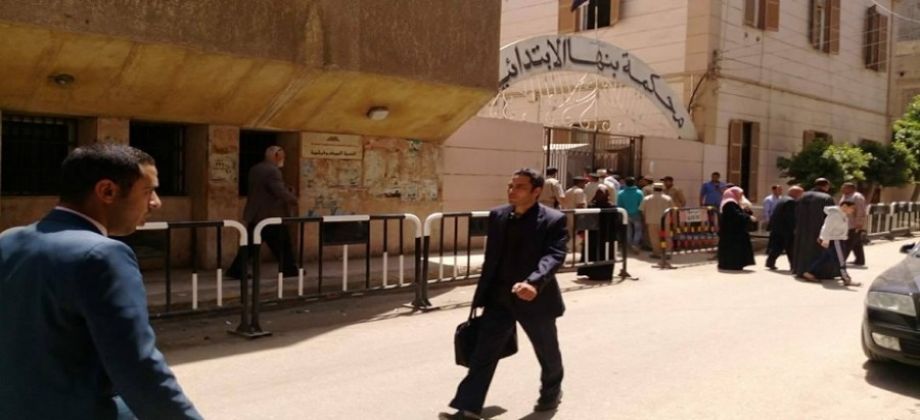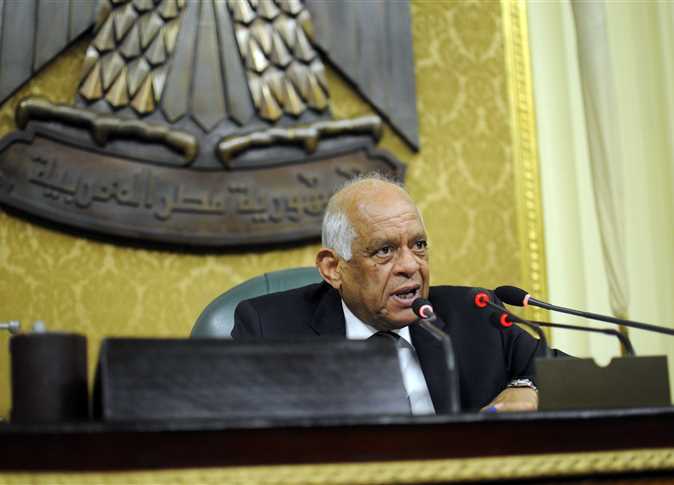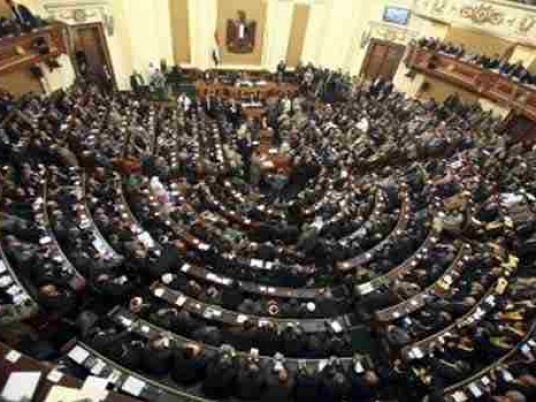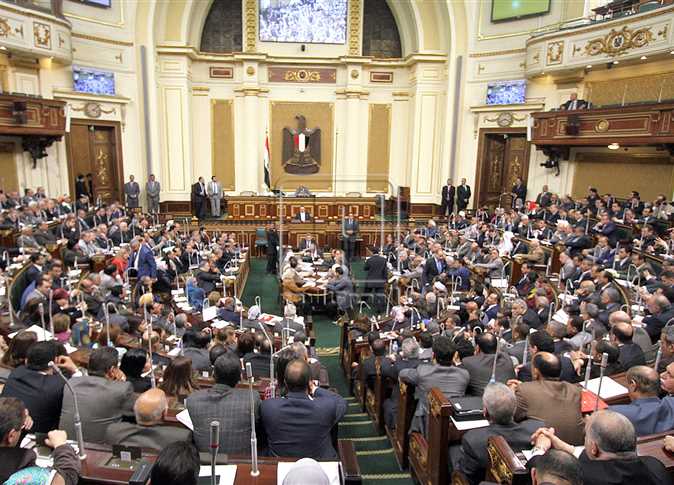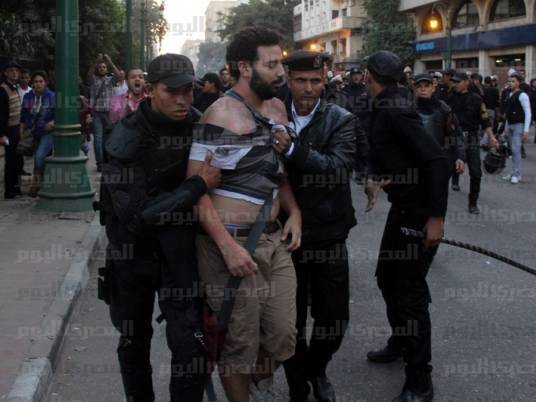
Egyptian police has violently dispersed three separate demonstrations on Tuesday of people who turned out to voice opposition to the newly enacted and controversial protest law that human rights group say severely limits freedom of speech.
Security forces used tear gas and water cannons against demonstrators at two sites in Downtown Cairo Tuesday afternoon, beating them with sticks as they pulled them from the crowds to arrest them.
A later round of tear gas hit protesters in Talaat Harb Square as the police tried to disperse the protest demanding the release of victims of the afternoon's arrest of over 30 activists.
More than 50 people were arrested, according to the Egyptian Center for Economic Rights. Many were taken to a police station in New Cairo, according to activists.
Among those arrested were Mona Seif, the high-profile activist and co-founder of the "No Military Trials" rights group, and revolutionary activist Salma Said, who were both released hours after their arrest.
The police even rounded up several prominent activists who had previously supported the military to overthrow Muslim Brotherhood-backed president
Around 13 of the 50 representatives on the committee charged with writing Egypt’s new constitution said they were freezing their memberships until the detainees were released, state media reported.
Outcry from all sides against the new law
The new protest law, enacted Sunday by Interim President Adly Mansour, was met with an outcry from both Islamist and liberal revolutionary powers as well as human rights groups, for what critics say is the cutting off Egyptians' right to free assembly and peaceful protests.
The law reinforces the fear that the military-backed government is slowly backtracking from the roadmap towards democracy and into an era of political oppression worse than that of the period under Hosni Mubarak.
Many opponents to the law have vowed to fight the law and work towards its repeal. On Monday, Ahmed Maher, founder of the 6 April Movement, described the newly-issued protest law as ‘unfair’ and said it ‘will be broken.’
“Any constitution against principles of 25 January revolution will be dropped like what preceded it,” he said, adding that requests would be submitted to protest in front of the Interior Ministry, demanding the dismissal of both the defense and interior ministers.
In a Monday press release, the Strong Egypt Party, led by former presidential hopeful and defected Muslim Brotherhood leader Abdel Moneim Abouel Fotouh, said it will “work, along with all political and social groups that believe in a democratic and modern country, on repealing the law through constitutional and legal methods as well as a peaceful struggle on streets to freely express our opinion.”
The official spokesperson of the movement, Hassan Shahin of the Tamarod campaign, which collected petitions leading to the ouster of the Islamist President Mohamed Morsy, Shaheen declared on Monday that protesting is a right Egyptians have acquired as a result from the 25 January revolution and its extension on 30 June, and called on the government to amend the law.
The protest law has also drawn international attention as well. The Obama administration expressed concerned over the new protest law. “The United States wants Egypt's transition to an inclusive democracy to succeed,” State Department spokeswoman Jen Psaki said in a statement after Egyptian security forces fired teargas to disperse university students who had defied the law.
“We urge the interim government to respect individual rights and we urge that the new constitution protect such rights,” she added.
UN High Commissioner for Human Rights Navi Pillay also slammed the protest law on Tuesday, describing it as “seriously flawed” and urging the government to amend it.
Pillay on Tuesday detailed the main flaws of the law, including unclear wording, excessive sanctions and mounting measures that security forces can use in dealing with protesters. “International law requires precision in detailing what specific conduct is prohibited by law,” she said.
Critics say new protest law overreaches
Though the law instated by the interim government is an attempt to reign in recent chaotic protests that are broadcasted internationally and scare investors, human rights groups argue it oversteps many boundaries.
The Mansour administration is using it as a buffer against the expected demonstrations in the second half of January as a result of the scheduled constitutional referendum. Inevitably, he says, not everyone will be happy with the constitution, which could spark massive protests and possibly swamp the country.
Many activists, such as Mohamed Adel, a founding member of 6 April Movement, say the new law is an attempt completely cut off the right for peaceful protests. “The law should be aimed at regulating protests not banning it. This is a reflection of a mental regime, it is meant to kill the revolution, not to mention the revolutionary idea itself,” said Adel.
Perhaps the most controversial part of the protest law requires prior notice if a protest will take place. Interior Minister Mohamed Ibrahim stressed in a meeting on Monday with his aides the necessity of dealing “decisively and strongly in a way to show the strength of the state in case of any protest occurred without previous notice from security apparatus.”
Prime Minister Hazem Beblawy told AFP on Sunday that the new law actually protects freedom of assembly. “It is not a law that limits the right to demonstrate, but it aims at protecting the right of protesters,” he said.
Beblawy also said the law does not stipulate that protesters need permission before staging demonstrations, but they must merely give advance “notice.”
Shahin from Taramod argues that the law could be better if two articles were amended, relating to the police’s right to attend private meetings and the right of the Interior Ministry to stop demonstrations before they occur, merely because the ministry claims it is not going to be peaceful.
According to Gamal Eid, the director of the Arabic Network for Human Rights Information, the law which is supposedly a product of two revolutions, is worse than the law passed in 1932 during the British occupation.
“It gives the right for police officers to fire the same birdshot that killed most protesters in 2011 revolution. Furthermore, it gives the Interior Ministry the right to disperse a protest in case slogans chanted are not included in the permitted notice,” says Eid. “This means, if someone you do not know and chanted his own slogans, the police can intervene.”
According to Eid, the 1923 law punished any violator with a sentence not exceeding six months in prison, now, after a revolution that called for protest rights, at least seven years sentence will be given.
Above all, Eid says, the Interior Ministry, against which people usually protest, is now the authority passing out permission for demonstrations.
The new law punishes any person “inciting” a protest with prison not custody, “which means at least five years in jail, so if there is someone tweeting or a journalist publishing news about non-notified protest, he or she would be considered an inciter,” argued Eid.
The human rights lawyer was suspicious that such law is targeting Muslim Brotherhood as pro-Morsy protests are gradually decreasing, but rather targeting the rising revolutionary and labor movements, not to mention, “more than 18 labor strikes occurred recently and is expected to rise amidst the government failure to meet their demands” said Eid.
Demonstrators mock new “anti”-protest law
The two political activists, Adel and Shahin, led a handful of protesters on Monday to Qasr El-Nil police station, downtown Cairo, to file a “mock” request to protest in Tahrir Square on 1 December against the new law.
“We are here to make fun of the law. How come I need an approval to protest from the agency or sector that I am protesting against? It does not make any sense that interior ministry must approve in advance the slogans used and the number of protesters in a protest” said Adel.
Both activists will demand in their protest, unlikely to be approved though, to put the current interior minister before trial for his responsibility for killing protesters in Mohamed Mahmoud anniversary on 19 November as well as dismissing the Beblawy-led interim government, including minister of defense and security sectors after their failure to protect Egypt’s security after 30 June revolution.
“The expected number of people participating in December protest will be 10 million people,” said Adel satirically.
In accordance to the new law, the group submitted official slogans to the Interior Ministry that will be chanted at the protest on December. “Eat popcorn, down with the protest law,” reads the request.
Rony Habib, one of the activists who came to Qasr el-Nil police station in Garden City to support Adel’s initiative, was resentful of the new law saying that the military-backed government means to hollow out the political scene from all revolutionary powers, using the clampdown on Islamists as an excuse. “Therefore, the only power that will arise is the military,” he argued.
Habib was injured in Mohamed Mahmoud’s second anniversary clashes, his both arms were bandaged. He said his left arm was injured with a live bullet and the other one with a birdshot. “Although I am Christian, I was referred to prosecution on charges of “belonging to Islamist group,” laughed Habib.

